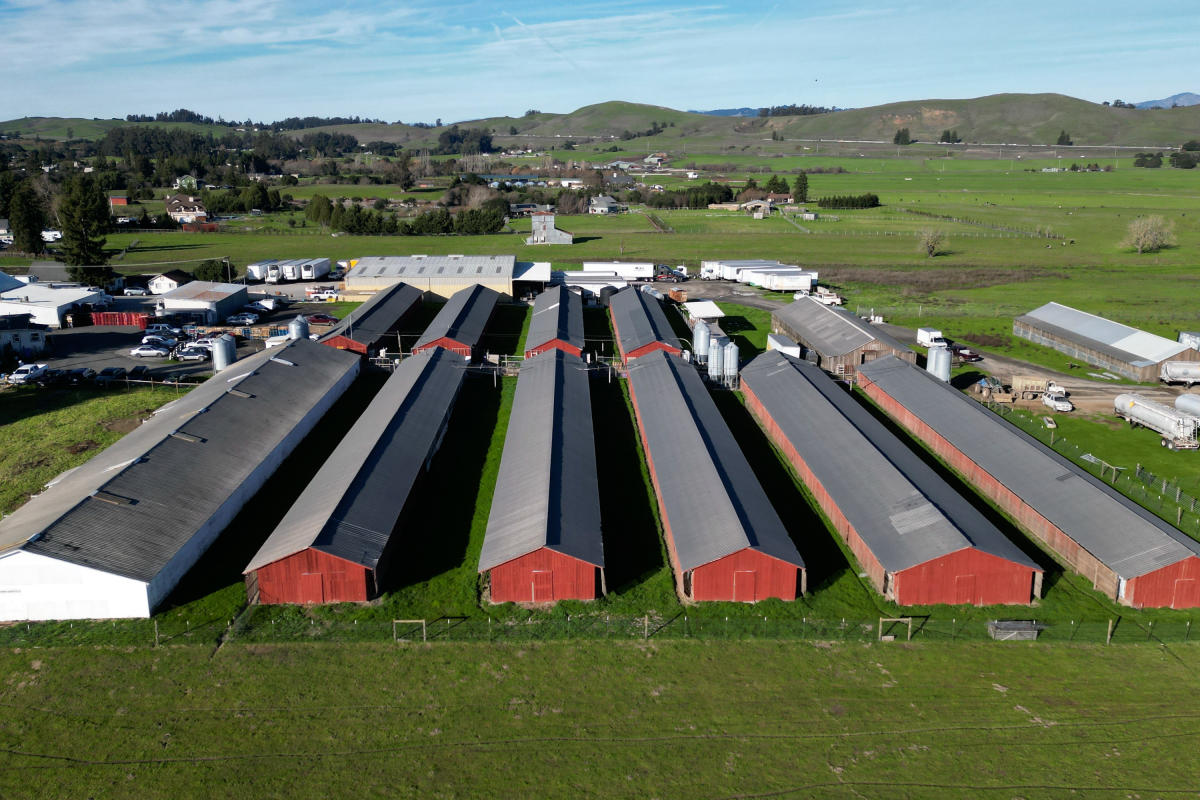PETALUMA, CA – Animal rights activists first invaded Mike Weber’s chicken ranch six years ago, in an effort to expose what they saw as the horrors of egg production in a region known as “American Provence” for its abundance of vineyards, dairies and organic farms.
That confrontation, which resulted in the arrests of 40 activists for trespassing, turned out to be just the first skirmish in a battle now playing out over animal rights and agriculture that will soon go to the ballot in Sonoma County. In November, voters will weigh in on a proposal to ban large poultry and livestock farms, which activists say are factory farms that pollute the environment and abuse animals in tightly packed confinements. Sonoma would be the first county in the United States to ban such facilities.
“People deserve a say in what happens in the county they live in, and people don’t want that to happen here,” said Lewis Bernier, a researcher for Direct Action Everywhere, a Berkeley-based group with a history of confrontational protests that have led to efforts to get the measure on the ballot. The group has also collected signatures to put a similar question before voters in Berkeley this fall, though this is largely symbolic because there are no commercial farms in the Bay Area college town.
In Sonoma, however, a measure that pits people who shop at farmers markets against those who supply them runs deep into the terroir. Once-fringe views on animal rights are becoming mainstream just as the country faces a rural economic crisis that has seen the loss of more than half a million farms since the 1980s. What’s happening in an iconic food-producing area could quickly spread elsewhere as suburban development encroaches on more and more agricultural areas across the country.
“If it can happen here,” says David McCuan, a professor of political science at Sonoma State University, “it can be on the ballot anywhere.”
Supporters of Measure J would force at least two dozen Sonoma County poultry and livestock operations to downsize or close within three years. Farmers say it is an attempt to establish a “vegan mandate” to end livestock farming and that the initiative would close more farms and have economic consequences both immediately and in the future.
“At the end of the day, they want to burn down our farm and all the other farms in Sonoma County,” said Weber, whose family has been producing eggs in the area since 1912.
The Sonoma aroma
Sonoma would be the first county in the U.S. to impose a complete ban on concentrated livestock feeding operations, a designation used by the Environmental Protection Agency to regulate agricultural waste discharges. Activists use the term interchangeably with “factory farms,” to describe a range of modern poultry and livestock operations, which involve raising and keeping animals in dense conditions.
Sonoma is dotted with hundreds of farms, large and small, and has deep rural roots. Petaluma, where Weber’s farm is located, has long been associated with the dairy and poultry industries and was once known as the “egg basket of the world.” The small town has a quintessential Americana charm. Much of Ronald Reagan’s classic 1984 campaign ad “Morning in America” was filmed in the city, as was the 1973 film “American Graffiti.”
That landscape may not have changed much, but Sonoma’s demographics have. Petaluma and nearby cities have become bedroom communities for people priced out of places closer to San Francisco and Silicon Valley — filled with newcomers accused of driving up housing prices and ridiculed for grumbling about the smell of manure that occasionally wafting through the area, a scent known as the ‘Sonoma aroma’. Petaluma is a city of nearly 60,000 residents, dotted with farm-to-table restaurants that cater to foodies.
The crosscurrents shaping Sonoma today — an area where people are willing to challenge the agricultural sector even as their local economy remains inexorably tied to it — were on display last month when the county Board of Supervisors held a public hearing after activists rousted 37,000 had collected signatures. , more than enough to make Measure J eligible for a vote.
At the May 14 meeting, proponents of the measure denounced factory farms for cruelty, polluting the air and water with waste and for being “breeding grounds for diseases” such as bird flu. Activists sought to counter a gloomy assessment from the local government, which projected widespread closures of agricultural activities and layoffs as a result of the introduction of the measure.
“These industrial facilities are harmful to animals,” said Cassie King, member of Direct Action Everywhere. “They exacerbate forest fires and droughts. They are breeding grounds for diseases, such as the aforementioned bird flu, which has spread to mammals and humans. They pollute our air and water. They have the greatest impact on the health of employees and people living near these facilities. .”
The supervisors warmly welcomed Measure J’s critics, including local dairy farmers and two well-known local manufacturers dependent on them, Clover Sonoma and Straus Family Creamery, and endorsed warnings about the measure’s likely economic impact.
“What we’re going to do is kill farms and kill jobs,” said James Gore, a former U.S. Department of Agriculture official who was elected to the board in 2014. “And then you’re going to push us to a place where that’s not the case. “doesn’t affect our ability to buy and sell, but it does really increase the likelihood that these lands will be converted to suburban, urban or other uses.”
Ultimately, supervisors agreed to put the measure up for a vote in November, but unanimously adopted a joint statement of opposition to the initiative. For the agriculture industry, the fact that a measure has gotten this far in Sonoma County is a harbinger of where this fight could go.
What came first
In May 2018, hundreds of people, organized by Direct Action Everywhere, traveled about an hour’s drive north of Berkeley to protest Weber Family Farms, which Mike owns with his brother Scott. Some entered the chicken coops and grabbed dozens of birds, including about ten that they claimed were sick and dying. The group argued that their action was legal under a California law against animal cruelty. “Folks, we are about to march into a huge factory farm in the heart of darkness and hell,” the group’s leader, Wayne Hsiung, declared, according to the video taken at the time. “We’re going to expose what’s happening inside and try to get some of the animals out.”
Hsiung, a lawyer and former candidate for mayor of Berkeley who has argued that animals should have the same rights as humans under the Constitution, held follow-up protests there and at Reichardt Duck Farm, also in Petaluma. The group has tried to bolster their arguments with photos of birds with apparently untreated illnesses and injuries.
“We must put an end to the most egregious atrocities happening today,” Bernier said. “We must put an end to it immediately.”
Weber disputes allegations of abuse, noting that its products are labeled “certified humane” by Humane Farm Animal Care, a nonprofit that says it uses veterinarians and animal scientists to set treatment standards. He said he also takes additional steps to monitor compliance at his company’s organic facilities and recycles his waste to sell as fertilizer. “I don’t know what we can do better,” he said. “All I can do is go bankrupt to make them happy.”
Measure J would likely have that impact. The initiative language appears to call for the phase-out of both large and medium-sized concentrated animal feeding operations (CAFOs). Under this interpretation, at least 60 poultry and livestock operations would have to close, according to the Sonoma County Farm Bureau.
But Bernier says this is a misinterpretation of the initiative and that there are no operations in the county that meet the EPA definition of a medium CAFO because of the way they manage waste. Under the coalition’s interpretation, Measure J would affect county dairies with 700 cows and egg producers with 82,000 birds.
The discussion about exactly which facilities would fall under Measure J is somewhat of a moot point for the local Farm Bureau. “Their ultimate goal is that they want to completely eradicate livestock farming and this is a stepping stone,” said Executive Director Dayna Ghirardelli.
Weber, who was forced to kill all 550,000 chickens at his main egg production facility in December due to an outbreak of bird flu, denounces accusations that he is mistreating animals, which he says would not be in his or any other farmer’s best interests.
“It is in our best interest to provide the ideal environment that is stress-free,” he said.
Many people today, he said, don’t understand what it takes to get food from farms to grocery stores. “If voters decide they want to make it illegal to eat meat, I’m not going to fight that. That’s for the voters to decide,” he said. “But they should not make the decision based on misleading information.”
Politics from table to farm
California voters statewide have shown in the recent past that they are receptive to animal welfare initiatives. In 2008, voters approved Proposition 2, which banned certain types of cramped cages for pregnant pigs, calves and laying hens. Ten years later, voters went even further with Proposition 12, a so-called “foie gras ban” that required farm animals to be given more space and chickens that produced eggs to be allowed to roam freely. Both were adopted with more than 60 percent of the votes.
There was also a bill introduced in February 2022 by two Democratic state lawmakers that would have banned new CAFOs in California. That measure never left the committee, due to opposition from agricultural interests. (Senator Cory Booker of New Jersey, who is vegan, has introduced similar legislation at the federal level.) Animal rights activists hope that if Sonoma voters bless such rules this fall, it could help reduce legislative resistance in Sacramento.
“If this goes ahead, in a province that is known as an agricultural province and prides itself on being a small farm, kind of province, then this opens up political cover to discuss the issue,” said Nickolaus Sackett, director of legislative affairs for Social Compassion in Legislation, a California-based animal rights group. “That means people want it and we should at least be having these conversations.”
Agricultural interests also recognize Measure J’s potential to pose a threat beyond Sonoma County. Most of the $176,000 raised by the Family Farmers Alliance, which is sponsored by the Sonoma County Farm Bureau, comes from farm organizations elsewhere in the state.
“Sonoma has grown tremendously into an area where many city people live,” said Bill Mattos, president of the California Poultry Federation, which is donating to the campaign. “So they have to be trained.”







